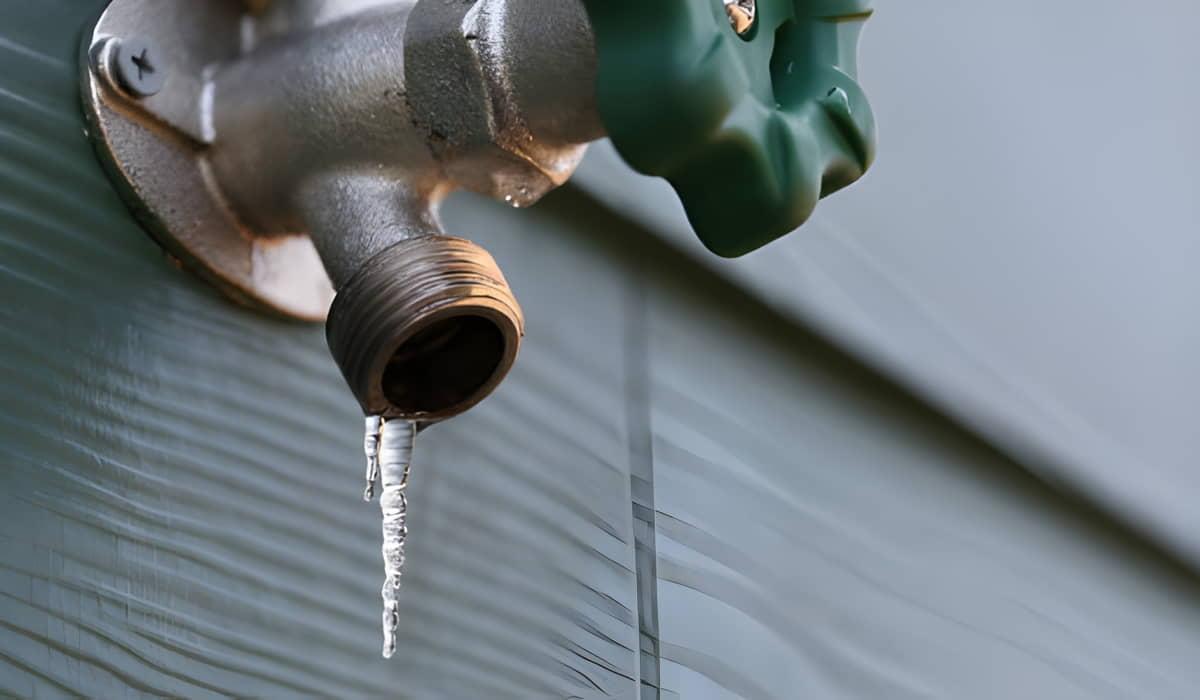Prevent frozen pipes by keeping your home above 55°F, letting faucets drip during freezing nights, and insulating exposed pipes. Open cabinet doors under sinks to let warm air circulate. These simple steps protect your plumbing from New Jersey’s harsh winter temperatures and save you from costly repairs.
Frozen pipes are a nightmare for New Jersey homeowners. When water freezes inside pipes, it expands and can crack them wide open. You’re looking at thousands in water damage and repair bills.
New Jersey winters hit hard. Temperatures drop below freezing for days or weeks. Your pipes are at risk, especially in unheated spaces like basements, attics, and garages.
Know Your Risk Zones
Some pipes freeze faster than others. Exterior walls are the biggest problem. Cold air hits these walls directly. Pipes inside them get ice-cold quick.
Check your basement and crawl spaces. These areas often lack proper heating. Garages are trouble spots too. Most people don’t heat them at all.
Outdoor faucets and hose bibs freeze first. They’re exposed to the elements with no protection. Give these special attention before winter arrives.
Insulate Your Pipes
Pipe insulation is cheap and easy to install. You can buy foam sleeves at any hardware store for a few bucks. They slip right over your pipes in minutes.
Focus on pipes in unheated areas first. Wrap everything you can reach in basements, crawl spaces, and attics. Don’t skip the hot water pipes – they freeze too when not in use.
For outdoor faucets, buy insulated covers. They’re like little jackets for your spigots. Install them before the first freeze hits.
Let Faucets Drip
Running water doesn’t freeze as easily as still water. When temperatures drop below 20°F, let your faucets drip overnight. A thin stream is enough.
Pick faucets on exterior walls. These are most likely to freeze. The small amount of wasted water costs pennies compared to burst pipe repairs.
Open both hot and cold taps slightly. This keeps water moving through your whole system.
Keep Your House Warm
Don’t crank down the heat when you leave for work or vacation. Keep your thermostat at 55°F minimum. This seems wasteful, but frozen pipes cost way more than heating bills.
Going away for the holidays? Leave the heat on. Ask a neighbor to check your house daily. One cold snap can destroy your plumbing while you’re gone.
Open Cabinet Doors
Bathroom and kitchen sinks often sit against exterior walls. The cabinets block warm air from reaching the pipes underneath.
Open these cabinet doors on cold nights. Let your home’s heat circulate around the pipes. This simple trick prevents many freeze-ups.
Remove any cleaning products if you have small kids or pets. Safety first.
Disconnect Garden Hoses
Water trapped in hoses can freeze and push back into your pipes. This causes cracks at the connection point.
Disconnect all outdoor hoses before winter. Drain them completely and store them in your garage or shed. Shut off the interior valve that feeds outdoor faucets if you have one.
Seal Air Leaks
Cold air sneaks into your home through tiny cracks and gaps. Check around pipes where they enter your house. Look for holes in your foundation or walls.
Use caulk or spray foam to seal these openings. This keeps cold air out and warm air in. Your heating bill will thank you too.
Know the Warning Signs
Pipes start showing problems before they burst. If your faucet only produces a trickle, ice might be blocking the pipe. Frost on exposed pipes is another red flag.
Strange smells can signal a crack. If you notice any of these signs, act fast. Turn off your water main and call a plumber immediately.
What to Do If Pipes Freeze
Don’t panic if a pipe freezes. Turn off your water main right away. This limits damage if the pipe cracks.
Open the frozen faucet. Apply heat to the pipe using a hair dryer or heating pad. Never use a torch or open flame – you’ll start a fire.
Work from the faucet toward the frozen area. The ice will melt slowly. If you can’t reach the frozen section or don’t feel comfortable, call a New Jersey plumber.
The Bottom Line
New Jersey winters are brutal on plumbing. A little prevention saves massive headaches and repair costs. Start preparing before temperatures drop. Your pipes will survive the season intact, and your wallet will stay full.



